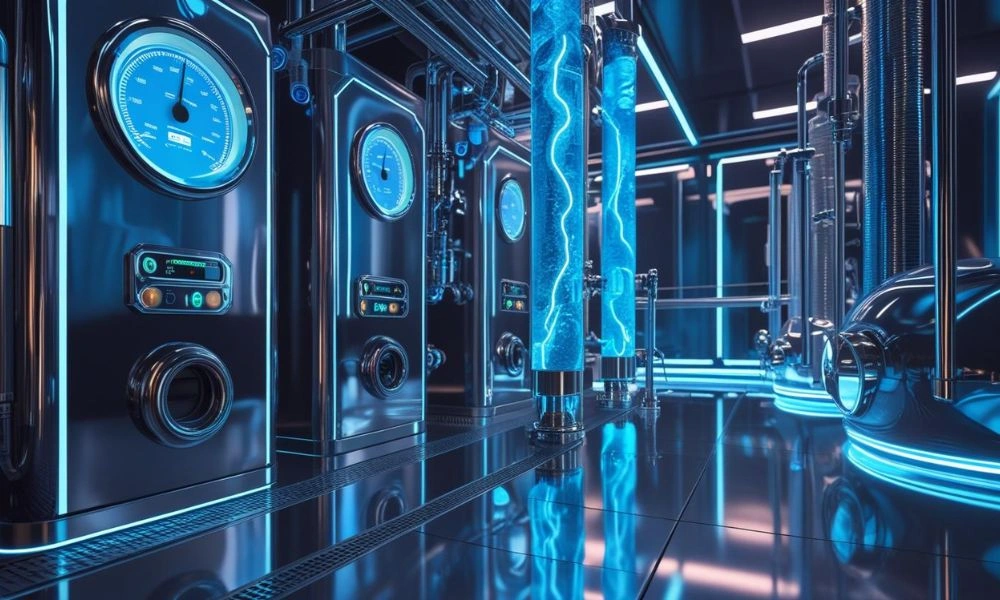Solid-state antiscalants provide an efficient, eco-friendly alternative to traditional water treatment chemicals. With safer handling, predictable performance, and no need for dosing systems, they’re ideal for industries seeking cost-effective, long-term solutions. WCSP brings this innovation to Pakistan’s water treatment landscape — offering cleaner systems and stronger ROI.
What Are the Benefits of Solid-State Antiscalants?
Scaling is the most frequent and expensive problem in industrial water treatment systems, particularly in RO (Reverse Osmosis), boilers, chillers, and cooling towers. For this, antiscalants have been used for decades based on chemicals, but a newer, wiser option is gaining popularity fast: Solid-State Antiscalants.
This article goes deep into what solid-state antiscalants are, their fundamental advantages, how they stand compared to conventional liquid chemicals, and why they’re a critical boost for contemporary water treatment facilities — particularly those that are served by Water Care Services Pakistan (WCSP).
What Are Solid-State Antiscalants?
Solid-state antiscalants are small, non-liquid chemical forms that will not allow for mineral scale development in water treatment plants. Rather than dosing chemical liquids into pipes, these slow-dissolving solids slowly release exact amounts of active ingredients over a period of time.
They are typically contained in cartridges or dosing units and don’t need pumps or power — making them particularly well-suited for decentralized and small-to-medium scale operations.

Why Scaling Is a Critical Problem in Water Treatment
Common scale-forming elements:
- Calcium carbonate (CaCO₃)
- Magnesium hydroxide (Mg(OH)₂)
- Silica
- Iron and manganese oxides
Scaling clogs membranes, damages pipelines, increases energy use, and decreases the life of costly filtration systems.
Impact of Scaling:
- 10% scale = 30% greater energy consumption
- Repeated shutdowns for cleaning
- High membrane and equipment replacement costs
- Decreased flow rates and pressure problems
That’s where solid-state antiscalants excel over traditional approaches.
Containerized/Packaged Type Systems
How Solid-State Antiscalants Work?
These antiscalants dissolve gradually as water passes over them, releasing inhibitors of scale that:
- Bind with hardness ions such as calcium and magnesium
- Inhibit crystal growth
- Alter crystal shape to suspend
- Shield membranes and surfaces against deposition
- Solid-State Antiscalant Key Benefits
No Mechanical Dosing Pumps Required
As opposed to liquid chemicals, solid-state antiscalants do not require mechanical dosing pumps or electricity. This minimizes:
- Capex (capital expenditure)
- Maintenance and calibration requirements
- Over- or underdosing risk
Non-Toxic and Safer Handling
Solid-state units are safer and easier to handle. They:
- Prevent spillage and chemical burns
- Minimize contact with toxic vapors
- Are generally NSF-certified and phosphate-free
Space-Efficient Design
Best suited for confined areas, they:
- Have a snug fit into compact filtration systems
- Can be formatted with cartridge-style arrangements
- Take up less storage space than liquid drums
Uniform Operation
Solid-state antiscalants provide:
- Predictable, controlled dosage
- No variation due to pump failure
- Weeks- or month-long efficiency
Environmentally Friendly
With reduced packaging, transportation emissions, and no chemical leakage hazard, they are:
- A less-polluting alternative to liquid products
- Easy to dispose of with little residue
- Containerized/Packaged Type Systems
Real-Life Use Case by WCSP
In a leather tanning plant in Kasur, WCSP replaced an orthodox antiscalant dosing system with a solid-state cartridge system. Results after 3 months:
- 40% reduction in membrane fouling
- Maintenance frequency decreased by 60%
- Annual chemical cost savings: PKR 650,000
- Zero chemical spill incidents
WCSP is now employing solid-state antiscalants in textile, food, dairy, and municipal RO plants in Pakistan.
Where Can You Apply Solid-State Antiscalants?
- Domestic RO Systems
- Industrial RO Plants
- Cooling TowersBoilers
- Chillers
- Desalination Plants
- Remote Sites & Off-grid Installations
They are especially beneficial in low-pressure or intermittent flow applications, where conventional dosing systems are impractical or unreliable.
WCSP Installation Hints
- Always install the cartridge prior to the membrane or RO stage
- Maintain proper flow rate and contact time
- Replace cartridges by flow capacity (e.g., every 50,000–100,000 liters) or time (e.g., 2–3 months)
- Apply only certified solid-state antiscalants to drinking water uses
WCSP’s Expert Take
“Solid-state antiscalants are the future of water treatment chemicals. They’re safer, more efficient, and aligned with our mission to provide eco-conscious, cost-effective solutions across Pakistan.”— WCSP Technical Director
Conclusion
Solid-state antiscalants are redefining chemical dosing in water treatment. They’re compact, cost-effective, safer to use, and ideal for Pakistan’s industrial and municipal sectors. WCSP continues to lead the way by integrating these innovations into RO systems, cooling towers, and beyond.
Frequently Asked Questions (FAQs)
What are solid-state antiscalants used for?
Solid-state antiscalants prevent scale buildup in water systems like RO plants, boilers, and cooling towers by slowly releasing scale inhibitors without requiring pumps or electricity.
How do solid-state antiscalants differ from liquid ones?
Unlike liquid antiscalants that need dosing systems and power, solid-state versions are cartridge-based, pump-free, safer to handle, and ideal for small, off-grid, or decentralized setups.
Are solid-state antiscalants safe for drinking water systems?
Yes, most are NSF-certified and phosphate-free, making them safe for use in potable water systems when installed before RO or filtration membranes.
How long does a solid-state antiscalant cartridge last?
Depending on the system flow and capacity, cartridges typically last between 50,000–100,000 liters or 2 to 3 months in continuous operations.
Do solid-state antiscalants require maintenance?
They need minimal maintenance — just regular cartridge replacement. There’s no need for calibration, dosing adjustments, or pump repair.
Can I use them in high-flow industrial systems?
Yes. Solid-state antiscalants are scalable for industrial use, including cooling towers, RO plants, and boilers, provided the correct cartridge size and number are used.
What types of scaling do they prevent?
They effectively inhibit scale from calcium carbonate, silica, iron, manganese oxides, and magnesium hydroxide — common culprits in industrial and municipal water systems.
Are solid-state systems environmentally friendly?
Absolutely. They have less packaging, no spill risk, lower transport emissions, and reduced chemical waste, making them a green alternative to liquid antiscalants.
Where are solid-state antiscalants best applied?
They’re perfect for remote locations, compact systems, intermittent-flow operations, and areas lacking skilled staff or stable electricity.
Why choose WCSP for solid-state antiscalant systems?
WCSP customizes cartridge systems for industries across Pakistan, offering high performance, technical support, and proven results in membrane life extension and cost savings.


